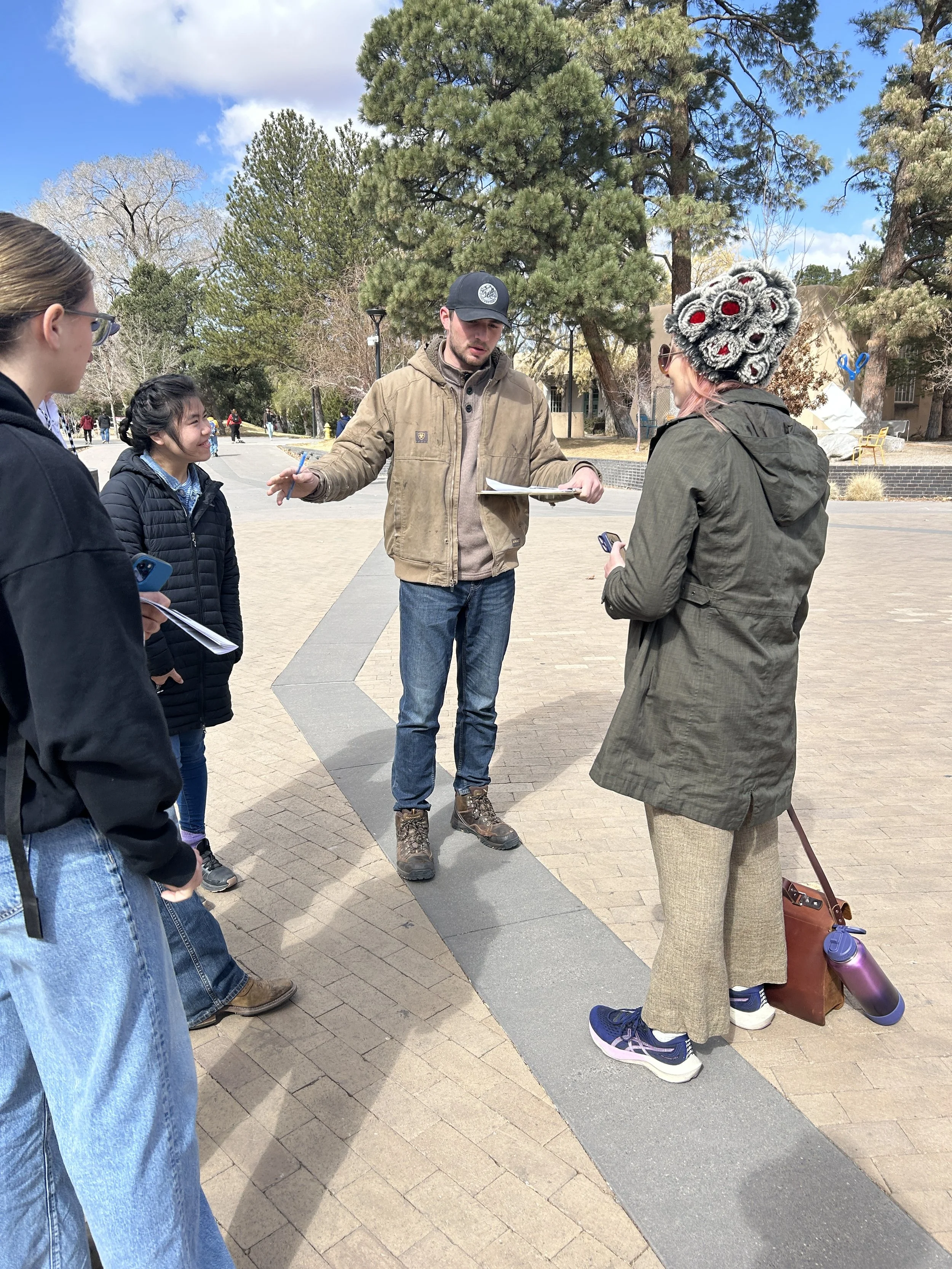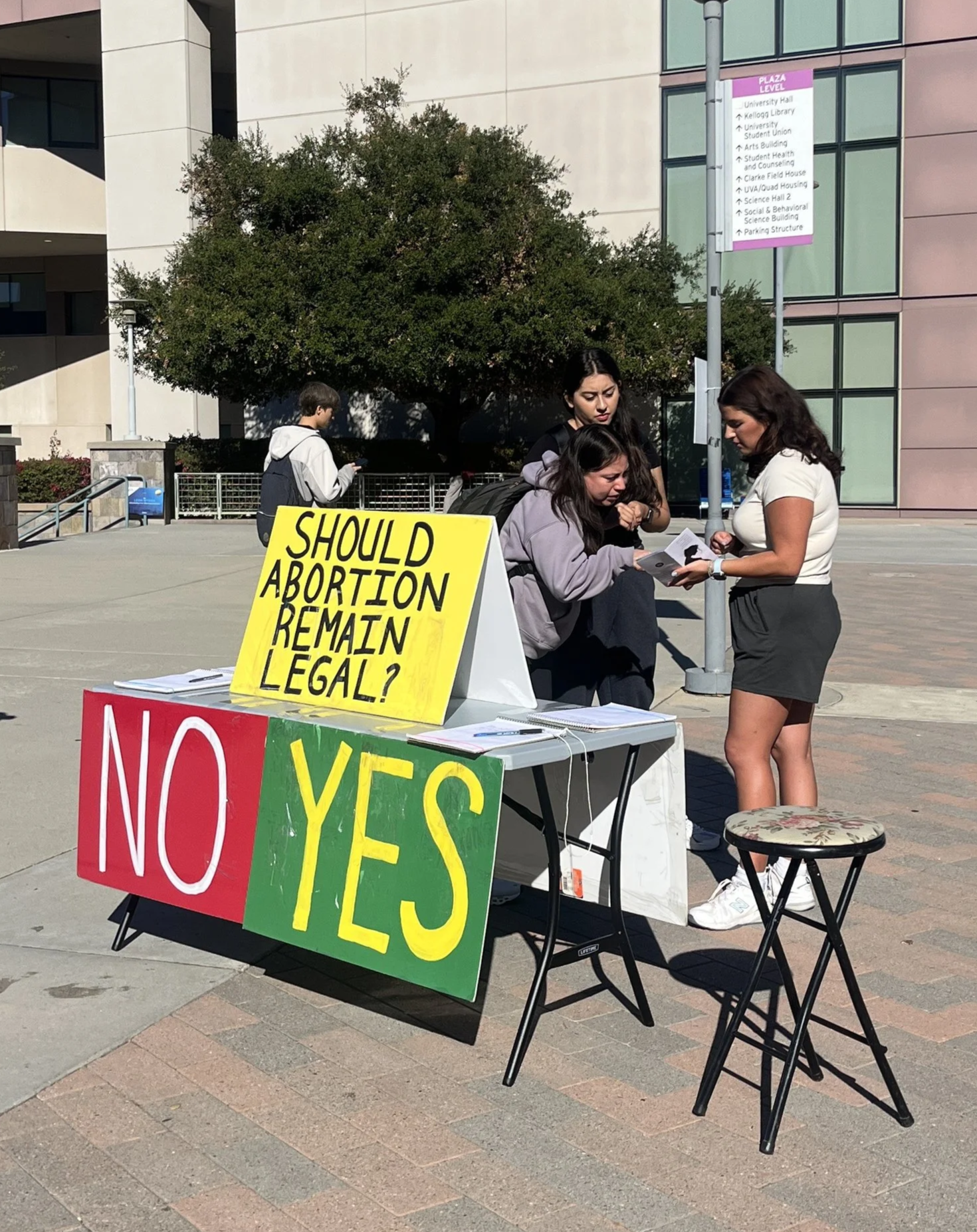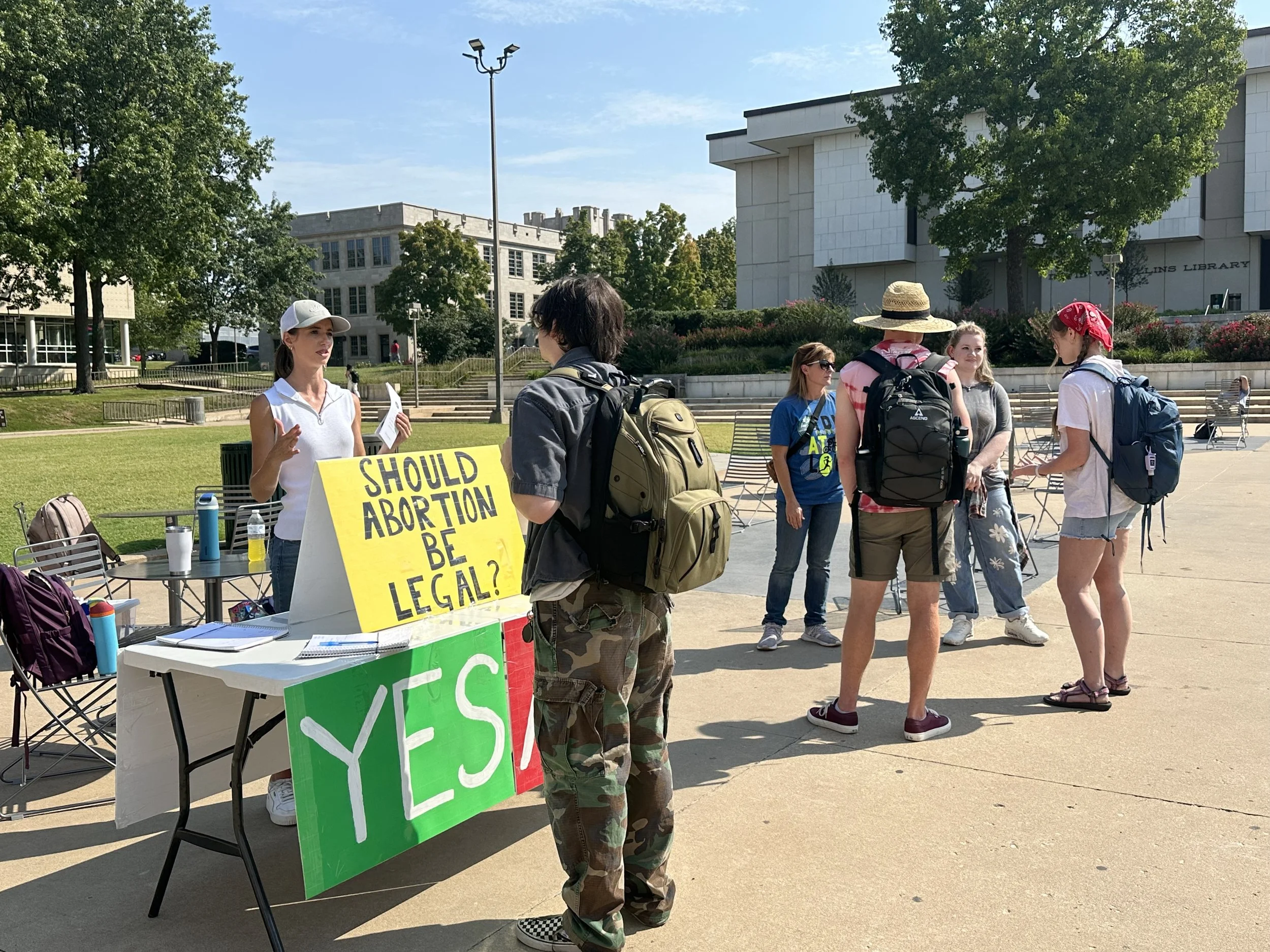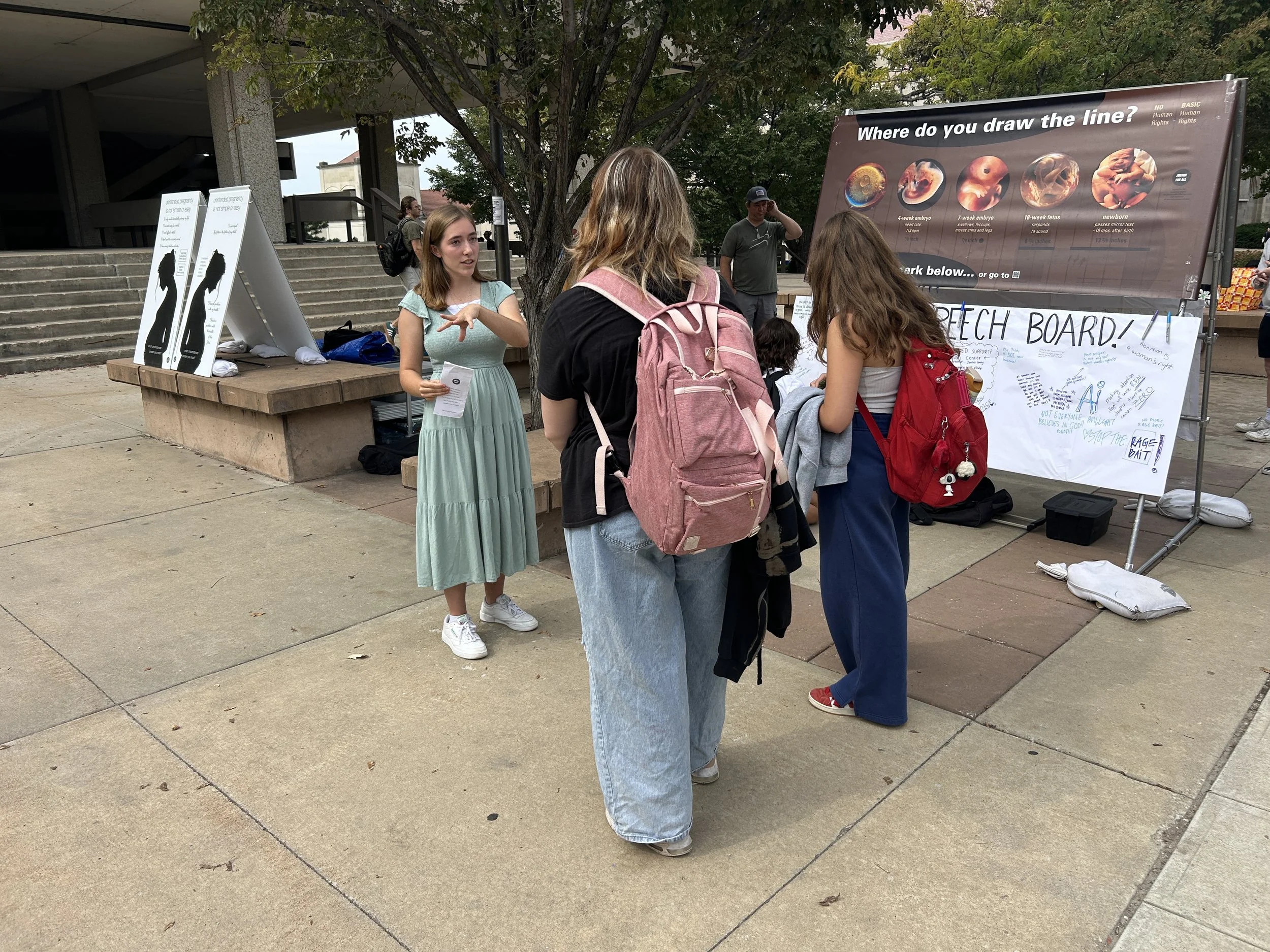Recently, veteran JFA trainer Rebecca Hotovy found an unsent email in her drafts folder. It contained a nearly complete newsletter detailing a conversation from years back. I was so taken with it, I wanted to share it with you. (Rebecca still coaches other JFA speakers part-time during brief breaks from her full-time job as mom to two precious boys.)
We know this story definitely happened at the University of Oklahoma, and we think it happened around 2015. Whatever the date, the story beautifully illustrates the power of JFA’s dialogue approach, the power of a few carefully crafted questions asked with an open heart, and the way in which our attitude has the power to make or break a conversation. - Steve Wagner, Executive Director
Impact Report, June 2022
Rebecca Hotovy, JFA Trainer Certification Coach and Trainer Emeritus
Several years ago at the University of Oklahoma (OU), as I stood next to the large exhibit, a young man approached me. I’ll call him Chris. Confident that abortion was a woman’s right, Chris started to explain why he felt abortion should remain legal. Several feet from me stood another man, likely twenty to thirty years older than Chris. Although this older man was not a volunteer with Justice For All, he held a pro-life view. He was close enough to hear my conversation with Chris, and as the conversation continued, he listened in.
Rebecca (center) interacts with an OU student in 2015 near a small version of the JFA Exhibit.
In the first few minutes of that discussion, I took time to figure out the reasoning behind Chris’s belief that abortion should remain legal. Without first understanding why Chris held his view or how he came to the conclusion that abortion should remain legal, I knew I wouldn’t be able help him see errors in his reasoning. I was also aware that blatantly pointing out any errors may upset him enough that he would end the conversation. If he didn’t end the conversation but he stayed and continued talking, it would likely make him put up barriers of self-defense that would prevent him from wanting to listen to the ideas being presented, even if he was physically present and talking. Sadly, I’ve seen this happen many times – two people begin to dialogue about a controversial subject, quickly start defending their own positions, and turn a conversation into two monologues because they feel offended. If they feel offended for whatever reason, they may hear words coming from the other person’s mouth, but they don’t listen to the meaning of the message of those words.
In my conversation with Chris, over time it became clear that he did not believe the unborn was biologically human. When I felt I had built a good rapport with him, I allowed our conversation to take a turn. I started asking questions not just to discover his reasoning in defense of legal abortion but also to challenge that reasoning. At this point in the conversation I knew he would welcome the challenge because he could see that I didn’t desire to push my agenda down his throat. The challenge questions I asked were exactly the ones we train participants to ask when they attend the Abortion: From Debate to Dialogue seminar. I said something like:
Rebecca: Chris, do you mean that you don’t believe the unborn is biologically a human being or that the unborn isn’t a human being that deserves the same rights as you and I do?
Chris: Oh, it’s not biologically a human being at all. It’s just a clump of cells in those early stages.
Rebecca: If I could offer evidence for why the unborn is a human being, would you mind?
Chris: Sure. Go ahead.
Rebecca: If the unborn is growing, isn’t it alive?
Chris: [pausing and then slowly nodding his head] Yeah, sure I can agree with that.
Rebecca: If the unborn has human parents, isn’t it human?
Chris: [pausing and pondering the question with a slight grin on his face] Yes.
It was his answer to my third question, though, that threw me for a loop.
Rebecca: And living human beings, like you and me, are valuable, aren’t they?
Chris: Oh my gosh. Yes.
There was another moment of silence as he continued to ponder the questions I had just asked that laid out a defense for the humanity of the unborn. We stood in silence for a while longer. Then he said something like:
Chris: Wow, okay, so I need to think through this more.
This was so unexpected to me because most students I talk to do not agree with each of these questions. They have all sorts of creative ideas to share, such as “Well, fire grows, and it’s not alive” or “Yeah, well a clump of cells might be alive and have human DNA, but that doesn’t mean it is a human being...Are tumors human beings?” or “Sperm are alive and have human DNA. Are all sperm valuable, too?”
Chris didn’t have any retorts like these. He simply agreed that the unborn was a human being.
Just as I thought the conversation was going really well, it took a turn for the worse. The pro-life man who had been listening in stepped close enough to us to join the conversation, turned to Chris, and snootily remarked, “She got ya! Didn’t she‽”
My heart dropped to my stomach. I had taken such care not to make Chris feel like I was attacking his position and to make him feel comfortable sharing his thoughts with me, and in less than three seconds someone who claimed to be pro-life obliterated all my efforts. Chris was as shocked as I was. His face showed it. He also became really nervous and started stumbling over his words.
One would think that I would easily become frustrated with people who hold beliefs against the dignity and sanctity of human life, but in this instance I became frustrated instead with this person who was like-minded to me in certain ways but didn’t realize the importance of treating the human standing in front of us with respect. Fortunately, I was able to jump back into the conversation, regain a good rapport with Chris, direct the conversation away from the “got ya” remark, and help him feel less nervous.
In hindsight, I now take another step back and realize that the art of learning to dialogue is a journey for everyone – the pro-life advocate and the pro-choice advocate alike. Prior to my training and work with Justice For All, if I had been that pro-life person standing there listening in on the conversation, I may have made a similar remark. Early on I didn’t understand that the way I shared the truth about the unborn could actually affect whether that truth helped pro-choice advocates change their minds. Thank you, Justice For All, for your gift of teaching me the beauty of dialoguing in love!
Note: Yes, that’s an intentional interrobang in the fourth from the last paragraph. Learn more about this controversial punctuation mark through this engaging podcast episode from 99 Percent Invisible.





